Jaguar F-Pace vs Mercedes GLE - Differences and prices compared
Compare performance (575 HP vs 634 HP), boot space and price (56400 £ vs 76300 £ ) at a glance. Find out which car is the better choice for you – Jaguar F-Pace or Mercedes GLE?
Costs and Efficiency:
Looking at overall running costs, both models reveal some interesting differences in everyday economy.
Jaguar F-Pace has a clearly perceptible advantage in terms of price – it starts at 56400 £ , while the Mercedes GLE costs 76300 £ . That’s a price difference of around 19870 £.
Fuel consumption also shows a difference: Jaguar F-Pace manages with 1.80 L and is therefore to a small extent more efficient than the Mercedes GLE with 2 L. The difference is about 0.20 L per 100 km.
As for electric range, the Mercedes GLE performs significantly better – achieving up to 114 km, about 50 km more than the Jaguar F-Pace.
Engine and Performance:
Power, torque and acceleration say a lot about how a car feels on the road. This is where you see which model delivers more driving dynamics.
When it comes to engine power, the Mercedes GLE has a slight edge – offering 634 HP compared to 575 HP. That’s roughly 59 HP more horsepower.
In acceleration from 0 to 100 km/h, the Mercedes GLE is minimal quicker – completing the sprint in 3.90 s, while the Jaguar F-Pace takes 4 s. That’s about 0.10 s faster.
In terms of top speed, the Jaguar F-Pace performs slight better – reaching 286 km/h, while the Mercedes GLE tops out at 280 km/h. The difference is around 6 km/h.
There’s also a difference in torque: Mercedes GLE pulls a bit stronger with 850 Nm compared to 700 Nm. That’s about 150 Nm difference.
Space and Everyday Use:
Beyond pure performance, interior space and usability matter most in daily life. This is where you see which car is more practical and versatile.
Both vehicles offer seating for 5 people.
In curb weight, Jaguar F-Pace is slightly lighter – 1951 kg compared to 2310 kg. The difference is around 359 kg.
In terms of boot space, the Mercedes GLE offers clearly perceptible more room – 655 L compared to 470 L. That’s a difference of about 185 L.
In maximum load capacity, the Mercedes GLE performs noticeable better – up to 2055 L, which is about 627 L more than the Jaguar F-Pace.
When it comes to payload, Mercedes GLE to a small extent takes the win – 705 kg compared to 589 kg. That’s a difference of about 116 kg.
Who comes out on top?
Overall, the Mercedes GLE shows itself to be dominates this comparison and secures the title of DriveDuel Champion.
It convinces with the more balanced overall package and proves to be the more versatile choice for everyday use.
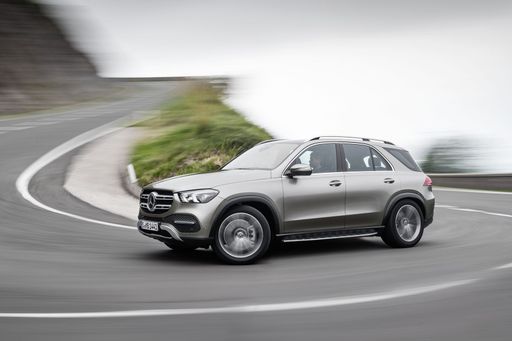
Mercedes GLE
Costs and Consumption
View detailed analysis
Engine and Performance
View detailed analysis
Dimensions and Body
View detailed analysis
Jaguar F-Pace
Jaguar F-Pace blends the prowling presence of a sports car with the practicality of an SUV, looking elegant while rewarding drivers with lively handling. If you crave something that feels special every time you climb in and prefer style and driving flair over blending into the parking lot, the F-Pace is a classy, slightly cheeky alternative to the usual German suspects.
details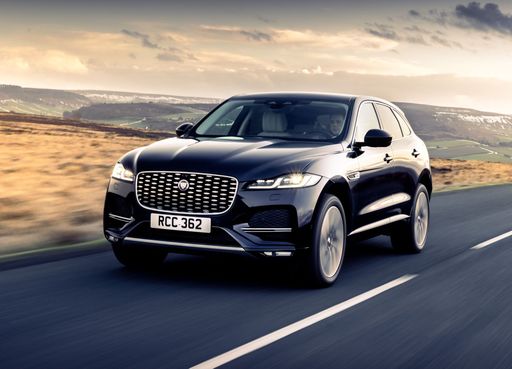
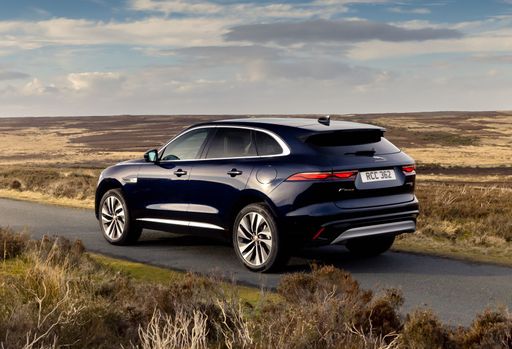
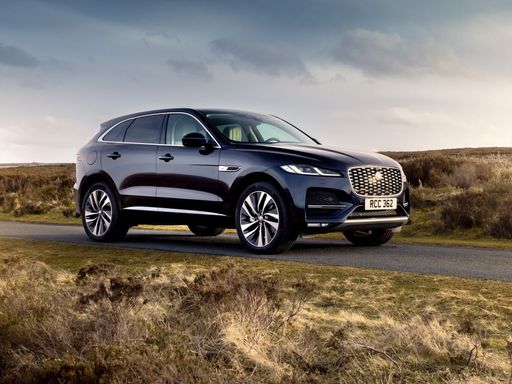
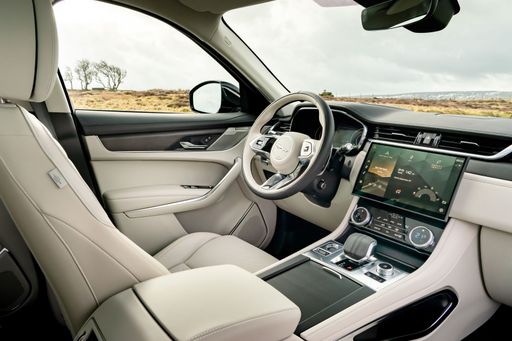
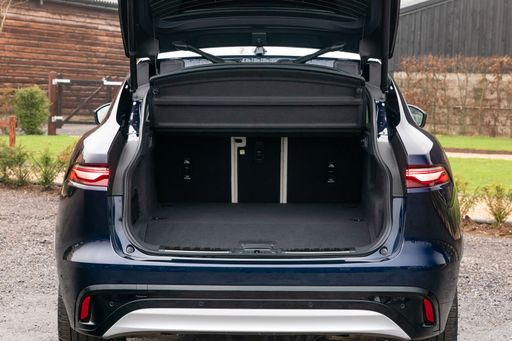
Mercedes GLE
The Mercedes GLE blends luxurious comfort with a confident road presence, wrapping tech and refinement in an SUV shape that still knows how to behave on a twisty back road. Inside it's plush and quiet, with clever storage and driver aids that make long trips effortless — plus the badge gives it that easy-to-respect curb appeal.
details
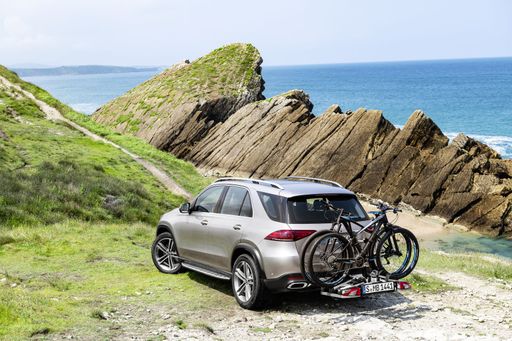
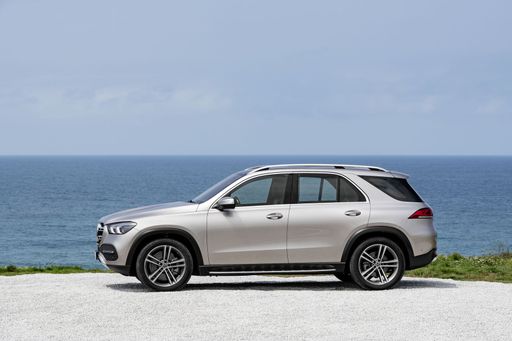
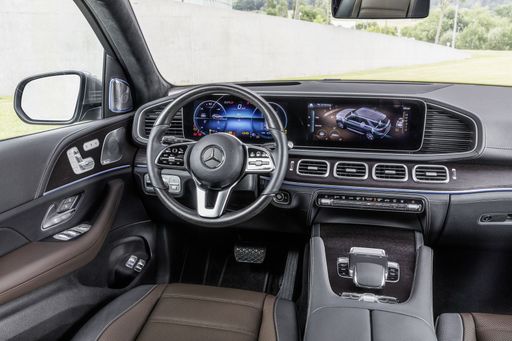
Costs and Consumption |
|
|---|---|
|
Price
56400 - 100800 £
|
Price
76300 - 175800 £
|
|
Consumption L/100km
1.8 - 12 L
|
Consumption L/100km
2 - 12.5 L
|
|
Consumption kWh/100km
-
|
Consumption kWh/100km
-
|
|
Electric Range
64 km
|
Electric Range
89 - 114 km
|
|
Battery Capacity
15.40 kWh
|
Battery Capacity
24.8 - 25 kWh
|
|
co2
41 - 274 g/km
|
co2
53 - 284 g/km
|
|
Fuel tank capacity
62 - 83 L
|
Fuel tank capacity
65 - 85 L
|
Dimensions and Body |
|
|---|---|
|
Body Type
SUV
|
Body Type
SUV
|
|
Seats
5
|
Seats
5
|
|
Doors
5
|
Doors
5
|
|
Curb weight
1951 - 2230 kg
|
Curb weight
2310 - 2800 kg
|
|
Trunk capacity
354 - 470 L
|
Trunk capacity
490 - 655 L
|
|
Length
4747 - 4762 mm
|
Length
4924 - 4961 mm
|
|
Width
1936 mm
|
Width
1947 mm
|
|
Height
1664 - 1670 mm
|
Height
1716 - 1797 mm
|
|
Max trunk capacity
1299 - 1428 L
|
Max trunk capacity
1645 - 2055 L
|
|
Payload
457 - 589 kg
|
Payload
460 - 705 kg
|
Engine and Performance |
|
|---|---|
|
Engine Type
Diesel MHEV, Petrol MHEV, Plugin Hybrid, Petrol
|
Engine Type
Petrol MHEV, Plugin Hybrid, Diesel MHEV
|
|
Transmission
Automatic
|
Transmission
Automatic
|
|
Transmission Detail
Automatic Gearbox
|
Transmission Detail
Automatic Gearbox
|
|
Drive Type
All-Wheel Drive
|
Drive Type
All-Wheel Drive
|
|
Power HP
163 - 575 HP
|
Power HP
289 - 634 HP
|
|
Acceleration 0-100km/h
4 - 10.1 s
|
Acceleration 0-100km/h
3.9 - 6.9 s
|
|
Max Speed
195 - 286 km/h
|
Max Speed
210 - 280 km/h
|
|
Torque
380 - 700 Nm
|
Torque
500 - 850 Nm
|
|
Number of Cylinders
4 - 8
|
Number of Cylinders
4 - 8
|
|
Power kW
120 - 423 kW
|
Power kW
213 - 466 kW
|
|
Engine capacity
1997 - 5000 cm3
|
Engine capacity
1993 - 3982 cm3
|
General |
|
|---|---|
|
Model Year
2024
|
Model Year
2024 - 2025
|
|
CO2 Efficiency Class
G, B
|
CO2 Efficiency Class
G, B, F
|
|
Brand
Jaguar
|
Brand
Mercedes-Benz
|
What drive types are available for the Jaguar F-Pace?
Available configurations include All-Wheel Drive.




